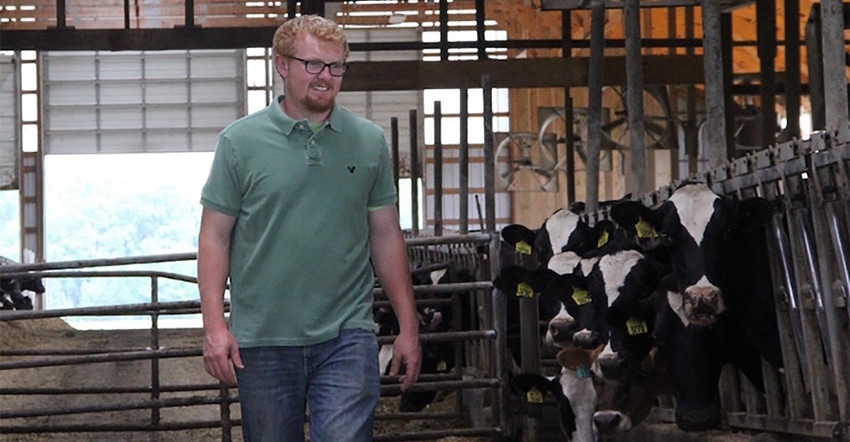
When your company is the maker of Today and Tomorrow mastitis treatment tubes, it may sound counterintuitive to reward dairy farmers for using fewer antibiotics, but that’s exactly what Boehringer Ingelheim has done.
“There are so many producers who deserve recognition for their continued commitment to advancing the dairy industry,” says Linda Tikofsky, DVM, Boehringer Ingelheim. “These producers are choosing to do the right thing for their cows and consumers by mitigating the use of antibiotics and striving to optimize animal welfare.”
Reducing antibiotic use
Boehringer Ingelheim’s Producers for Progress recognition program celebrates dairy producers who demonstrate a strong commitment to animal well-being by using fewer antibiotics.
“After careful consideration of more than 65 applicants by an expert panel of judges,” Tikofsky says, “Paul Lippert of Grass Ridge Farm LLC in Pittsville was selected as the grand prizewinner in Boehringer Ingelheim’s 2020 Producers for Progress recognition program.”
Lippert, 32, farms in a limited liability company with his father, Matt, and his younger brother Carl. They milk 615 Holstein and Jersey cows on their central Wisconsin farm.
As a herdsman and human resources manager at his family-owned dairy farm, Lippert is constantly looking for ways to enhance animal welfare and believes employees perform their best when they understand the reasons behind how and why they’re completing each task.
“We encourage employees to ask questions and provide feedback on a regular basis,” Lippert says. “We hold monthly meetings to discuss a variety of topics — one of which is goal-setting and rewarding employees for meeting those goals.
“Having interns the past four years has also pressed us to evaluate and improve our dairy’s procedures. One of these projects included setting up on-farm culturing of mastitis cases to improve treatment efficacy.”
Lippert says they use a teat sealant when they dry off cows. “It’s easier, faster and less expensive than dry cow treatment,” he explains. “We test for mastitis, and we don’t blanket-treat all of our dry cows. The only cows that get dry cow treatment are cows that had a mastitis event or had a high cell count. We are getting close to eliminating dry cow treatment all together.”
By not using dry cow treatment, milk from fresh cows can go into the milk cooler a lot quicker.
“A lot of cows that test positive for mastitis will self-cure in a day or two if they come down with mastitis during their lactation,” Lippert says. “We still pump electrolytes and fluids into the cow if they get a flare-up.”
The Lipperts emphasize cleanliness, use sand bedding in their stalls and use good protocols. “We also do a lot of vaccinating to prevent mastitis,” Lippert says.
“We want to recognize farmers who emphasize prevention rather than treatment,” Tikofsky says.
The Lipperts’ somatic cell count has averaged under 100,000 for the past four years. Their herd produces 90 pounds of milk per cow per day, with 3.9% butterfat and 3.2% protein.
Other winners
Daren Rubingh, Rubingh’s Dairyland, Ellsworth, Mich., is the first-place winner in the 2020 Producers for Progress recognition program, while Hans Breitenmoser, Breitenmoser Family Farms of Merrill, Wis., is the second-place winner.
Rubingh notes that mastitis is one of the most common and costly diseases found on dairy operations. He takes a six-step approach to mastitis management, which includes several disease prevention measures and using antibiotics only when needed.
“I personally milk every day so I can keep a close eye on the equipment, the cows and their teat end health,” Rubingh says. “If my cattle are not clean, comfortable and well-cared for, then I am not satisfied.”
Breitenmoser says, “We are nothing without our dairy cattle and our consumers. We owe it to our consumers to make sure that we do our due diligence, and our main priority has to be the animals we’re responsible for. We do well by both the animals and the consumers when we use antibiotics judiciously.”
Judges for this year’s program included Sandra Godden, DVM, University of Minnesota; Patrick Gorden, DVM, Iowa State University; and Tikofsky.
This is the fourth year Boehringer Ingelheim has sponsored the contest. Producers for Progress celebrates those who help protect the future of the dairy industry. More information about the program is available at producers4progress.com.
About the Author(s)
You May Also Like






